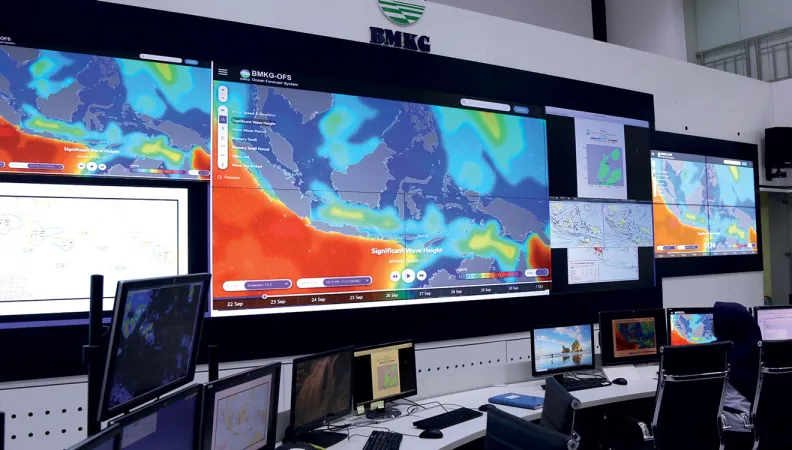Share the page
Indonesia: Marine Meteorology on the Front Lines
Published on

A capacity building project has just been launched in the marine meteorology sector in Indonesia. The objective: address increasingly frequent extreme climate events and strengthen the resilience of coastal populations through data collection.
With over 17,000 islands, Indonesia is the world’s largest archipelago and has a vast maritime domain, which plays a major role in the country’s identity, security and development. Furthermore, the increase in maritime activities in these waters and the impact of climate change generate a growing demand for reliable information and services from BMKG, the national Meteorological, Climatological and Geophysical Agency. To address this demand, the institution aims to develop its expertise in marine meteorology.
Better anticipate extreme events
Climate change poses a serious threat to the country, at both the environmental and socioeconomic levels, especially since over 50 million people live less than 3 km from the coast. The IPCC report released in 2018 forecasts a dramatic increase in the frequency of typhoons, heavier rainfall and droughts on the archipelago within the next few years.
The report stresses the need for effective meteorological data collection, analysis and dissemination systems for the people and sectors exposed to such dangerous conditions. The idea is to be able to predict and anticipate these events, disseminate information sufficiently in advance to limit the damage, and then to develop strategies and systems to keep people informed.
Ongoing French mobilization
Between 2012 and 2015, BMKG had already initiated modernization. A capacity building project financed by the French Treasury allowed it to strengthen its terrestrial observation network in 33 provinces and set up a homogeneous information system at the central level (Jakarta) and regional level (among five regional centers).
A second program was then launched on 19 December 2019 to set up a comprehensive system for information, weather and climate forecasting and maritime services for users. Agence Française de Développement (AFD) is supporting this project with a loan and technical assistance for a total of €65 million, in line with its strategic priority in the maritime sector, in particular in the field of maritime transport, fishing, oceanography and marine meteorology. The French Treasury is contributing €43 million.
This project seeks to improve marine meteorology modeling and forecasting capacities, provide equipment to strengthen the observation system and collect data.
International issues
In addition, the project will contribute to improving the planning and adaptation capacities of populations, risk management services and stakeholders in the maritime economy, as well as to reducing economic losses caused by natural disasters and extreme weather events. The monitoring of the ocean and of climate change will be improved to prepare vulnerable populations for climate risks, and make them more resilient.
“The strengthening of the national meteorological agency is a structural project”, says Adeline Souf, research officer at AFD’s Jakarta agency. “Six million people directly make their livelihoods from fishing and 25% of the world's sea traffic passes through the Straits of Malacca. When we add the fact that the water temperature and characteristics of the air above the Indonesian seas have an impact on climatic phenomena such as the Asian monsoons and El Niño, we see the importance of strengthening climatological analysis systems in Indonesia.”
